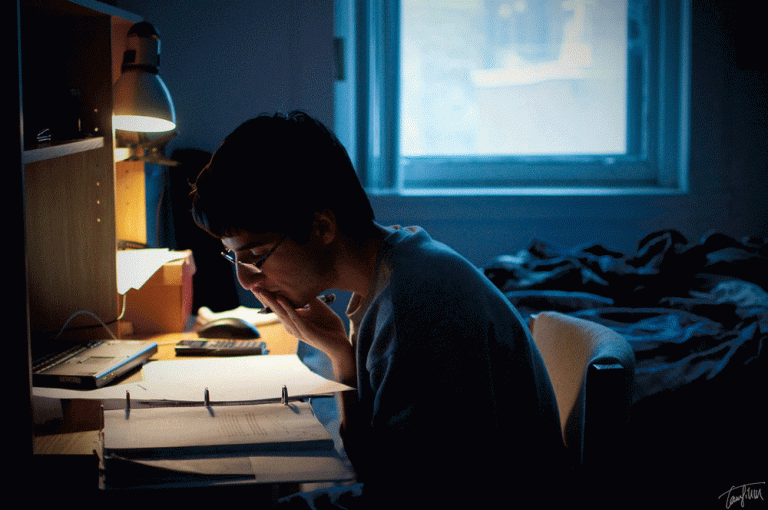
Jack Shea
“I’ll stay up for an extra hour or go an extra couple of consecutive days forgoing sleep to get that assignment done or pass a class.” This is the logic of many UCSB students who overlook the toll sleep deprivation has on the body. Focused on getting the best grades, or working long hours for optimal results, many people don’t understand the physical reactions of the sleepless body.
The Anxiety and Depression Association of America argues that “the risks of inadequate sleep extend way beyond tiredness … [such as] poor performance at work or school, increased risk of injury, and health problems.” Burning the candle at both ends, as in avoiding sleep, leads to these greater issues. Reconsidering sleep schedules to avoid these consequences have been shown to improve student’s health.
Sleep is a bodily priority. “In addition to anxiety and mood disorders, those with sleep disorders are [at] risk for heart disease, heart failure, irregular heartbeat, heart attack, high blood pressure, stroke, diabetes, and obesity,” according to the Anxiety and Depression Association of America’s website. This is to say that an exam is not worth these issues.
“What is one exam? I can always make up for sleep later,” ponders the student/worker. But scientists researching the neurological effects of sleep encourage people to listen to the body.
Derk-jan Dijk and Malcolm Von Schantz, of the Surrey Sleep Research Centre and Centre for Chronobiology, illustrate through extensive research in 2005 that the “sleep-wake cycle as well as the status of the homeostat do indeed feed back onto the circadian oscillator. Thus, although functionally and neuroanatomically independent, the two oscillators interact.”
In other words, research strongly suggests that the human body’s biological balances depend on the twenty-four hour light and energy temporal distribution. The human body functions at optimal performance with intrinsic needs to adhere to the Earth’s rotations. The body knows what it needs. If one finds their self yawning and struggling to keep eyes open, it might be best for one to consider calling it a day.
This is due to the suprachiasmatic nucleus (SCN) located in the human brain’s hypothalamus, regulating the body’s understanding of time in its interpretation of and lack of light variations from the sun. Intersections of nerve cells, synapses, “are extensively rebuilt during the sleep-wake cycle,” according to a 2017 Molecular and Cellular Neuroscience article published by doctors at Laboratory of Proteomics, Institute of Biology, Eötvös Loránd University.
Their same research proves if one avoids sleep, the synapses diffuse neurotransmitters, and the body saturates the synapses into overproduction, meaning “synapses became rigid, explaining the sleep deprivation-induced impairments in memory consolidation.” Memory impairment issues include the inability to hold a thought and forgetfulness, both of which add more stress to busy student/worker lifestyles.
Activity in the SCN stimulates CREM (Cyclic adenosine monophosphate response element modulators), which produces proteins responsible for the body’s production of melatonin, which itself initiates drowsiness. The human body has evolved to adjust to environmental changes in exposure to light; moreover, its system is “flexible and dictated by night length,” as written by Jörg Stehle, a cellular and molecular anatomy professor at Goethe-Universität Frankfurt, in a 1993 study.
Stehle argues in the same study that “signals from the SCN dictate the competence of ICER inducibility.” Adrenergic signals direct rhythmic expressions of the transcriptional repressor CREM in the pineal gland. His groundbreaking research clarifies the human body’s dependence on light exposure and rest. The human body is dependent upon a regular schedule evolved from its earthly rotational light schedules.
A Neurology Now brief on the benefits of a good night’s sleep mentions that brain cell relationships strengthen when people get some shut-eye. Such activity is responsible for the permanent processing of other human experiences in all senses, such as sound, sight, and emotion.
“They spread more like a wave that begins near your ear, spirals through your cortex toward the top of the back of your head, then moves onto the forehead area before circling back to the starting point,” argues Dr. Beth Malow, a researcher at the Vanderbilt Sleep Division at Vanderbilt University. In order to optimize storage in our brain’s capacities, humans need to keep sleep a priority.
Sleep Health, the journal of the National Sleep Foundation, concludes the average amount of sleep needed is “7 to 9 hours for young adults and adults, and 7 to 8 hours of sleep for older adults.” Pushing the body to its limits for grades is impressive, but the body will not make up for sleep and health effects the same way great grades will for sleep deprivation.
The same is to be said about pushing the body beyond its limits for work. Overtime may yield extra cash. However, that is quite meaningless if that cash is spent on guilt-ridden medical bills. Short-term pain, such as dragging throughout the day after pulling an all-nighter studying, may be livable, but the long-term effects on the brain and one’s overall health are proven to be detrimental and not worth the risks.










